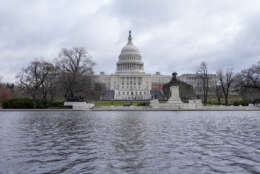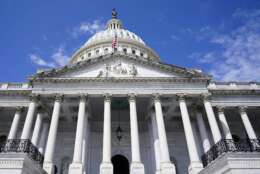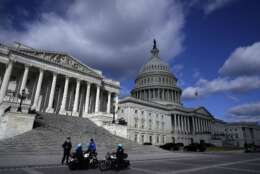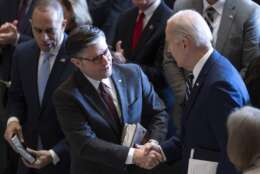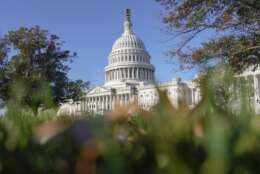U.S. News
-
Lawmakers have introduced a $1.2 trillion spending package that sets the stage for avoiding a partial government shutdown for several key federal agencies.
March 21, 2024 -
Negotiators from Congress and the White House are scrambling to complete work on funding government agencies for the fiscal year and avoid a partial shutdown.
March 18, 2024 A unanimous Supreme Court has ruled public officials can sometimes be sued for blocking their critics on social media, an issue that first arose for the high court in a case involving then-President Donald Trump. Justice Amy Coney Barrett wrote for the court Friday, saying officials who use personal accounts to make official statements may not be free to delete comments about those statements or block critics altogether. But Barrett wrote that “state officials have private lives and their own constitutional rights.” The cases forced the court to deal with the competing free speech rights of public officials and their constituents in a rapidly evolving virtual world.
March 15, 2024-
House passes $460 billion package of spending bills. Senate expected to act before shutdown deadline
The Senate is expected to take up the legislation before a midnight Friday shutdown deadline. And lawmakers are negotiating a second package of six bills.
March 06, 2024 -
Congress approves short-term extension to avoid shutdown, buy more time for final spending agreement
The bill now goes to President Joe Biden to be signed into law. The short-term extension is the fourth in recent months.
February 29, 2024 -
Congressional leaders have announced a tentative agreement to prevent a government shutdown, for now.
February 28, 2024 -
Congressional leaders emerged from an “intense” Oval Office meeting with President Joe Biden speaking about avoiding a partial government shutdown.
February 27, 2024 -
The Pentagon has completed its review of Defense Secretary’s Lloyd Austin’s failure last month to quickly notify the president and other senior leaders about his hospitalization for complications from prostate cancer surgery.
February 08, 2024 -
The IRS says it expects to collect hundreds of billions of dollars more in overdue and unpaid taxes than previously anticipated using funding provided to the agency by the Democrats’ Inflation Reduction Act. That's according to new analysis released Tuesday by the Treasury Department and the IRS. The report says tax revenues are expected to increase by as much as $561 billion from 2024 to 2034, which is substantially more than previous estimates. The Congressional Budget Office in 2022 estimated that tax revenues would increase by $180.4 billion over the 2022 to 2031 period.
February 06, 2024 -
Conservative Supreme Court justices have voiced support for weakening the power of federal regulators, but it's unclear whether a majority would overturn a major 40-year-old decision. Billions of dollars are potentially at stake in front of a court that was remade during Donald Trump’s presidency by conservative interests that were motivated as much by weakening the regulatory state as by social issues including abortion. The court on Wednesday debated whether to overturn a 1984 case colloquially known as Chevron. Courts have relied on the case to uphold regulations, including on the environment, public health, workplace safety and consumer protections. The justices heard cases from New Jersey and Rhode Island.
January 18, 2024 -
Congressional leaders have reached an agreement on overall spending levels for the current fiscal year that could help avoid a partial government shutdown later this month. House Speaker Mike Johnson is hailing the agreement in a letter to colleagues as “the most favorable budget agreement Republicans have achieved in over a decade.” President Joe Biden says the agreement is one step closer "to preventing a needless government shutdown and protecting important national priorities.” Lawmakers needed an agreement on overall spending levels so that appropriators could write the bills that set line-by-line money for agencies. Funding is set to lapse Jan. 19 for some agencies and Feb. 2 for others.
January 07, 2024 -
A federal judge has issued a temporary restraining order barring removal of a memorial to Confederate soldiers at Arlington National Cemetery. A group called Defend Arlington, affiliated with a group called Save Southern Heritage Florida, filed a lawsuit Sunday in federal court in Alexandria seeking the restraining order. A hearing has been scheduled for Wednesday. Work to remove the memorial had begun Monday before the restraining order was issued, but the memorial remains in place on cemetery grounds. The Army had planned to remove the memorial this week. Cemetery officials say the removal complies with a congressional mandate. More than 40 House Republicans wrote a letter seeking to block the removal.
December 18, 2023 -
The House has passed a defense policy bill that authorizes the biggest pay raise for troops in more than two decades. Supporters overcame objections from some conservatives concerned it didn’t do enough on cultural issues, such as restricting the Pentagon’s diversity initiatives and gender-affirming health care for transgender service members. The Senate had already overwhelmingly passed the bill on Wednesday, so now it goes to President Joe Biden’s desk to be signed into law. One of the most divisive aspects of the bill is a short-term extension of a surveillance program aimed at preventing terrorism and catching spies. Opponents of the extension wanted changes designed to boost privacy protections for Americans.
December 14, 2023 -
Air Force disciplines 15 as IG finds that security failures led to massive classified documents leak
The Air Force inspector general says the massive classified documents leak by a service member this year was made worse by the intentional failure of multiple officials to take required action on his suspicious behavior.
December 11, 2023 -
The Senate in a single stroke has approved about 425 military promotions after Sen. Tommy Tuberville of Alabama ended a monthslong blockade of nominations over a Pentagon abortion policy. Tuberville had been under pressure from members of both sides of the political aisle to end his holds as senators complained about the toll it was taking on service members and their families, and on military readiness. Tuberville said holds would continue, however, for about 11 of the highest-ranking military officers. President Joe Biden calls the Senate’s action long overdue and says the military confirmations should never have been held up.
December 05, 2023


